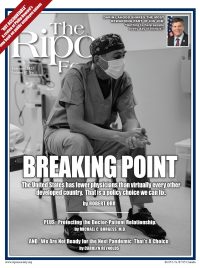
Remember March 2020, when our world changed overnight and our businesses, schools, and social lives shut down due to a novel, deadly, and fast-moving virus? As we mark the third anniversary of the COVID-19 pandemic, it all seems like a distant bad dream: masks are off, boosters sit unused, free tests and treatments will soon end. After more than one million lives lost and $14 trillion in U.S. taxpayer funds for the COVID response, Americans have put the pandemic squarely in the rear-view mirror and have determined the threat is over.
The problem: Hundreds of Americans are still dying each day from COVID-19, while the next pandemic could strike at any time – and be much more deadly. In many ways we are even less prepared than before COVID-19. Burned out health workers have left the profession in droves, leaving massive staffing shortages. Health systems everywhere have been stretched to the max, especially in the most vulnerable communities and countries. Disinformation, distrust of public health authorities, and vaccine hesitancy are at all-time highs, with fewer people willing to adhere to public health measures that can stop pandemics from spreading. COVID-19 also exposed systemic failures due to years of neglect and underinvestment in pandemic preparedness, ignoring experts’ warnings. The pandemic itself became politicized, subjecting the response and future-thinking efforts to partisan squabbling instead of taking bold action to address an existential threat to our health, economy, and security.
Hundreds of Americans are still dying each day from COVID-19, while the next pandemic could strike at any time – and be much more deadly. In many ways we are even less prepared than before COVID-19.
There is some good news. In its final days, the 117th Congress passed two significant pieces of legislation with strong bipartisan support: the U.S. Global Health Security and International Pandemic Prevention and Response Act and the PREVENT Pandemics Act. Taken together, they rightly elevate and codify pandemic preparedness as a priority for domestic and global health, and for national security. They direct the Executive Branch to make structural leadership changes, including establishing a new Office of Pandemic Preparedness and Response Policy and a U.S. Coordinator for Global Health Security at the White House. In parallel and consistent with the GHS Act, Secretary of State Antony Blinken announced his intent to create a new Bureau of Global Health Security and Diplomacy at the State Department under the leadership of Ambassador John Nkengasong, the current U.S. Global AIDS Coordinator.
In line with the new National Biodefense Strategy, the PREVENT Act authorized the Advanced Research Projects Agency for Health (ARPA-H) within the National Institutes of Health. This and other provisions in the bill aim to accelerate research, development, and manufacturing of new countermeasures to address emerging disease threats.
Both bills increase Congressional oversight of the federal government’s pandemic readiness plans. They also authorize increased spending at home and abroad to bolster pandemic preparedness and response, including for the U.S. contribution to the newly established Pandemic Fund at the World Bank to help low- and middle-income countries bolster their capacity to detect, prevent, and respond to potential pandemics.
These are welcome steps, but they are insufficient to meet the scope of the challenge. Here are four things the U.S. government should do to ensure America and the world are better prepared for the next pandemic threat:
Approve the funding. Congress has authorized spending increases, but appropriators need to act. The President’s Fiscal Year 2023 Budget Request included $88 billion in new mandatory funding to strengthen domestic and global preparedness, including $4.5 billion over 5 years for the Pandemic Fund. Congress largely ignored the request. The Biden Administration needs to go at it again in its soon-to-be-released FY24 budget, and this time forge a bipartisan deal with Congressional leaders to make this a must-pass priority, in addition to current spending.
We must treat pandemic preparedness with the same sustained level of priority, planning, investment, and innovation as we do our military and economic defenses – to ensure we are always ready for the next threat.
Bridge the domestic-global divide. Pandemics are global threats with national and local impacts. The delays in making COVID-19 vaccines accessible globally have caused the spread of new variants and prolonged the pandemic here. Congress must dispense with limited thinking that divides global and domestic policy. Along with bolstering our domestic public health, research and development capabilities, U.S. support for global efforts like the Coalition for Epidemic Preparedness Innovations (CEPI) and a pandemic countermeasures platform serve American interests by accelerating access to tools to help stop outbreaks where they happen.
Strengthen our global institutions. A stronger World Health Organization with the mandate and resources to investigate emerging outbreaks and foster rapid data sharing among countries is a vital part of our pandemic arsenal. Similarly, the International Monetary Fund and multilateral development banks could do much more to tackle the global threats of pandemics and climate change. Treasury Secretary Janet Yellen has urged other nations to agree on a package of World Bank reforms this year, and Congress should offer its full support.
Change our mindset. Pandemics are not just a health issue. COVID has impacted every aspect of our lives and economy. We must treat pandemic preparedness with the same sustained level of priority, planning, investment, and innovation as we do our military and economic defenses – to ensure we are always ready for the next threat.
Outbreaks will continue to happen, but letting them turn into pandemics is a costly political choice. No one wants to go back to March 2020, so let’s make the smart choice to invest now in pandemic preparedness. That is something both sides of the aisle should agree on.
Carolyn Reynolds is Co-Founder of Pandemic Action Network, a global coalition of more than 350 organizations driving collective action to address the COVID-19 crisis and ensure the world is better prepared for the next pandemic. She is also a Senior Associate (non-resident) at the Center for Strategic and International Studies.




